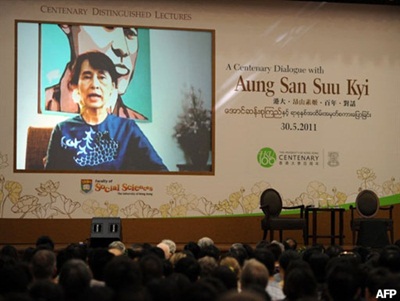Aung San Suu Kyi told students in Hong Kong via a video speech that she hopes to travel outside of Burma in the near future and visit them. The university awarded her an honorary doctorate of law.
 Burma's democracy leader Aung San Suu Kyi speaks to an audience at Hong Kong University via video link in 2011. Photo: AFP
Burma's democracy leader Aung San Suu Kyi speaks to an audience at Hong Kong University via video link in 2011. Photo: AFP
Suu Kyi has spent most of the past two decades under house arrest, and she has not been allowed to travel outside the country since 1988. She accepted her Nobel laureate prize while under house arrest.
As she accepted her award, she called for the rule of law in Burma, which has undergone a series of democratic openings during the past year, and will hold its second election in two decades on April 1.
Released from detention in 2010, said she would like to go abroad, if only for “a matter of days, or even a matter of hours,” according to an article by Agence France Presse.
“I hope though that in the near future, it will be possible for me to travel out of Burma, and that then I will be able to come to you, and be part of your campus life, for perhaps just a very short period,” she said in a video message.
Suu Kyi returned to Burma from Britain in 1988 to visit her dying mother. She refused to leave in 1999 when her husband, Michael Aris, was dying of cancer in Britain, fearing that she would be refused re-entry by the military regime, who feared her power as an advocate for democracy. The regime denied Aris a visa to vist his wife before he died. The story of their life together has been made into a recent film, “The Lady.”
Since her release from house arrest, the country has moved from a dictatorship to a parliamentary system of government, which is dominated by former and current military officers.
The new government, led by former general Thein Sein, has enacted a series of reforms, including freeing political prisoners and welcoming Suu Kyi back into the political mainstream. She is currently running for a seat in Parliament.
She led the National League for Democracy (NLD) to a landslide victory in an election in 1990 but the ruling junta refused to accept the result.
A 2010 vote, in which a party packed with former generals won, was marred by widespread complaints of cheating. The government has said she is free to travel but many of her supporters still express concern that she might not be allowed to return.
Suu Kyi has received many international awards and prizes including the Rafto Prize and the Sakharov Prize for Freedom of Thought in 1990. In 1992, she was awarded the Jawaharlal Nehru Award for International Understanding by the government of India and the International Simón Bolívar Prize from the government of Venezuela. In 2007, Canada made her an honorary citizen of that country, one of only five people ever to receive the honor. In 2011, she was awarded the Wallenberg Medal.


